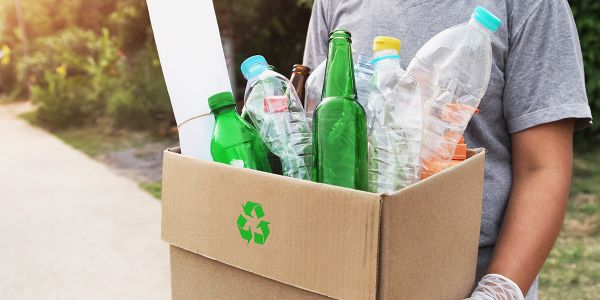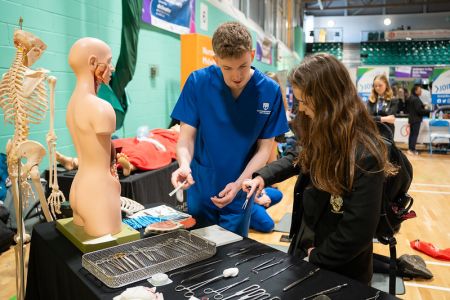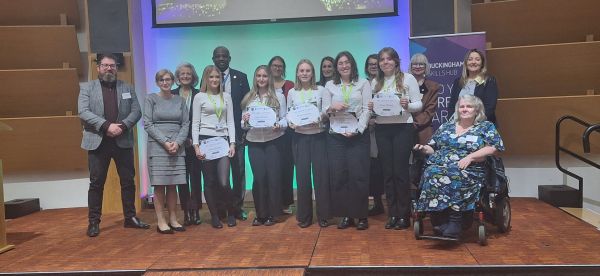- By Philippa Batting, Managing Director, Buckinghamshire Business First
- 4 November, 2021

Share by email
People overestimate what they can achieve in one year, and underestimate what they can achieve in a decade. Multiple people are credited with versions of this sentiment, but the central idea is:
if you want to accomplish something great, don’t just picture the far away goal that may seem near-impossible right now, instead think about the first small thing you can do in order to make that goal possible. A decade’s worth of small steps beats a few big steps taken every now and then.
In the recent UN assessment report on climate change, scientists expressed unequivocal confidence that human activity is changing the climate in unprecedented ways, but that if global emissions can be reduced by half by 2030 and to Net Zero by 2050, there is a good chance of global warming being kept in check.
Of course, doing something by 2030 doesn’t mean starting in 2029, it means starting today. While 2030 may seem a long way off, and 2050 even further, time flies.
Focus on what you can do
While governments and major stakeholders meet at COP26 to thrash out the 'big picture' challenges that climate change brings, individuals may wonder what they can do to have a positive impact, given the scale of the problem and the feeling that one person cannot change the world (although the Attenboroughs and Thunbergs of the world may disagree).
Yes, the need is urgent. But if you want to ‘go green’ and reduce your carbon emissions, it’s unlikely you’ll be able to do everything at once.
Stating that, in 12 months' time, you will be composting all your leftovers, driving an electric car, have fitted solar panels to your home and/or business, have cut out all non-recyclable packaging from your food shop, no longer be taking any flights, and be working from home as much as possible just creates the kind of to-do list that probably ends up in the recycling bin without a single tick on it.
Instead, think about the very first thing you could do in order to make progress on one of your goals, such as:
- reading a few articles on how to compost food
- striking up a conversation around the dinner table about going electric
- reading people’s experiences of installing solar panels
- switching one brand with non-recyclable packaging to a recyclable alternative in your food shop every week or so
- reading about places and attractions along train routes to those UK or European destinations that you would normally fly to
- and, for employees and employers, asking/enabling people to work from home at least one day a week
Then take the next small step in each of those processes.
Taking these steps in tandem with the usual good practices of recycling and turning lights and water taps off when not needed, will set you on a path that doesn’t actually feel so arduous.
Then imagine 60 million people all taking similar small steps and then, by 2030, we could have made real and necessary progress.
In short: a little difference from a lot of people goes a long way.
Think of the hermit crabs...
If the connection between plastic waste and environmental destruction needs reinforcing, think about where rubbish can end up:
- Hermit crabs are using plastic waste as shells. A quick online search about the importance of hermit crabs to the ecosystem (and the economy) shows why this is a huge issue.
- Turtles have been eating plastic bags mistaking them for jellyfish, and get entangled by plastic rings discarded from drinks.
- And that's not to mention landfill sites around the world - with millions of people living near and working on landfill sites, picking up scraps to sell.
Meanwhile, the amount of edible food thrown away and the amount of food left to rot before being thrown away would be hard to explain to the estimated 800 million people who are affected by hunger around the world.
Climate commitments are the beginning - not the end
As at COP26, any climate commitment made is simply a commitment yet to be fulfilled.
But it's a start. That's why Buckinghamshire Business First made its own Climate Commitment this year, joining the United Nations Race to Zero campaign. Buckinghamshire Business First has committed to cutting our greenhouse gas emissions by at least 50% before 2030, and achieving net zero emissions by 2050.
Organisations can learn all about the Race to Zero and how to make their own pledge to reduce carbon emissions to the level required to combat the climate crisis.
Public attitudes to climate change
Of course, climate action needs willing people. So what is the public’s attitude towards climate change and reducing emissions?
The government has been surveying UK households on climate change and other key topics since 2012. The latest results show that more than half of the public believe that climate change is either entirely or mainly caused by human activity. This is crucial, because if somebody believes their behaviour affects climate change, surely they will understand the need to adapt their behaviour in order to reduce their impact. And vice versa, of course.
Most people (8 out of 10) said they gave a lot or a fair amount of thought to energy saving at home, and there was strong support for renewable energy sources such as solar, tidal and off-shore wind. However, 2 in 10 people gave little to no thought to energy saving. The survey revealed that most people have noticed the impact of climate change in the UK, but only just over half thought that their own local area had been affected.
Responsibility for climate change
Meanwhile, according to respondents, responsibility for tackling the effects of climate change lies, in order, with the government, then the public, then businesses.
We all share some level of responsibility, and while COP26 will hopefully lead to legislative action, we can all make plans of our own; plans that move us as a population one small step forward at a time, not dismissing 2030 as the distant future, but also not simply collecting a series of unachievable and easily-abandoned goals that could be better approached by focusing on the small things..
So, read about composting, pick one food item to switch, ask your boss for a day working from home to save those commuting miles, then keep going with the next small steps, and hopefully, come 2030, the planet will be all the better for it.
Reach out for support
There is support available for businesses wanting to reduce their carbon emissions, save money, minimise waste, and progress on their journey to net zero. Contact our team for more information: email [email protected] or book in a chat via this online form.







